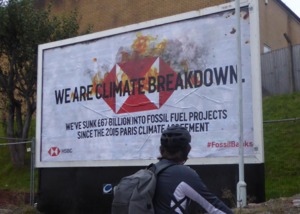A green wish come true or more greenwash?

Announcements about the UK government’s first green bond and mandatory climate risk disclosure are welcome steps, but they’re also baby steps that rely too heavily on the market to solve the climate crisis. We need stronger action from the Treasury and the Bank of England to avoid the risk of corporate greenwashing.
By launching the government’s first green bond and making climate risk disclosure mandatory across the economy within the next five years, the government finally appears to be taking the link between the financial sector and the climate crisis seriously. Although there is concern that these actions are piecemeal given the scale of the crisis we face, and rely too heavily on self-regulation by private firms.
Chancellor Sunak’s announcement of the UK’s first green government bond, follows 16 other countries including Germany and Sweden. Proceeds from the bond, which are expected to result in billions in new government spending, will be earmarked for large-scale public investment in funding a fair, green transition. But the truth is, a truly fair, green transition will require far more in public investment. There is no reason that all government bonds and spending couldn’t become green, given the scale of investment required, and the level of public support for putting the environment at the heart of our covid recovery.
Whilst the move towards mandatory disclosure, while again welcome, may not be enough to divert all private finance away from environmental destructive activities. It’s one of the policy changes we called on new Governor Andrew Bailey to make back in March, but mandatory disclosure is just the first thing that needs to happen, and should have happened already, the 2025 deadline is too slow. The risk of corporate greenwashing also remains high, as recently highlighted by Brandalism’s campaign against HSBC.

As long as high-carbon businesses like oil companies and airports spend billions advertising their environmentally friendly credentials and continue issuing supposedly ‘green’ bonds – all the while still profiting from the climate crisis – we cannot trust them to do more. Stepping back and leaving private financial institutions to self regulate was a contributing factor to the 2008 financial crisis. Led purely by self-interest, we cannot expect the invisible hand of the market to guide us out of the climate crisis either. When private firms stand to profit from destructive behaviour, it’s time for public institutions to step in.
Both government announcements came alongside the Bank of England setting a new date for climate stress testing in June 2021, after postponing earlier this year under the pretext of the Covid crisis. This is another step in the right direction, but the Bank could still do more to green its activities, by divesting its carbon-intensive corporate quantitative easing programme and invest directly in more green government bonds. They could also use their regulatory power over private banks to steer private funding away from high-carbon projects, as we’re calling for alongside 350.org and SumofUS – add your name to the petition here.
As former Bank of England Governor Mark Carney made clear earlier this year; climate change is “a crisis that involves the whole world and from which no one will be able to self-isolate”. This week’s announcements are welcome but we must move further and faster. There can be no more excuses.